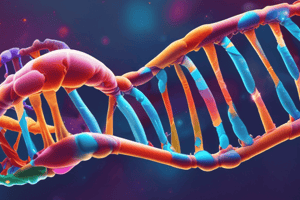Podcast
Questions and Answers
What are the building blocks of genetic material?
What are the building blocks of genetic material?
- Nucleotides (correct)
- Proteins
- Fatty acids
- Amino acids
Which base pairs with adenine in DNA?
Which base pairs with adenine in DNA?
- Thymine (correct)
- Cytosine
- Uracil
- Guanine
What type of RNA carries genetic information from DNA to the ribosome?
What type of RNA carries genetic information from DNA to the ribosome?
- Small interfering RNA (siRNA)
- Messenger RNA (mRNA) (correct)
- Ribosomal RNA (rRNA)
- Transfer RNA (tRNA)
What is the primary sugar component of RNA?
What is the primary sugar component of RNA?
During cell division, chromatin further condenses into which structure?
During cell division, chromatin further condenses into which structure?
Which of the following is NOT a function of DNA?
Which of the following is NOT a function of DNA?
What type of bond holds the base pairs together in the DNA helix?
What type of bond holds the base pairs together in the DNA helix?
What is the primary function of genetic material in a cell?
What is the primary function of genetic material in a cell?
Which of the following accurately describes eukaryotic cells?
Which of the following accurately describes eukaryotic cells?
Where is the DNA located in prokaryotic cells?
Where is the DNA located in prokaryotic cells?
Which statement about proteins is accurate?
Which statement about proteins is accurate?
What are the two main types of genetic material found in living organisms?
What are the two main types of genetic material found in living organisms?
What is the nucleoid region in prokaryotic cells responsible for?
What is the nucleoid region in prokaryotic cells responsible for?
What are the two main steps of protein synthesis?
What are the two main steps of protein synthesis?
Which of the following is NOT a function of proteins in the body?
Which of the following is NOT a function of proteins in the body?
Flashcards
Genetic Material
Genetic Material
The instructions for a cell's structure and function; the hereditary material that carries genetic information and passes it between generations.
Eukaryotic Cell
Eukaryotic Cell
A cell with a nucleus and membrane-bound organelles.
Prokaryotic Cell
Prokaryotic Cell
A cell without a nucleus or membrane-bound organelles.
Nucleus (eukaryotes)
Nucleus (eukaryotes)
Signup and view all the flashcards
Nucleoid Region (prokaryotes)
Nucleoid Region (prokaryotes)
Signup and view all the flashcards
DNA (deoxyribonucleic acid)
DNA (deoxyribonucleic acid)
Signup and view all the flashcards
Protein synthesis
Protein synthesis
Signup and view all the flashcards
Protein Function
Protein Function
Signup and view all the flashcards
Nucleotide
Nucleotide
Signup and view all the flashcards
DNA Bases
DNA Bases
Signup and view all the flashcards
DNA Structure
DNA Structure
Signup and view all the flashcards
RNA Bases
RNA Bases
Signup and view all the flashcards
RNA Function
RNA Function
Signup and view all the flashcards
Chromatin
Chromatin
Signup and view all the flashcards
Study Notes
Genetic Material Overview
- Genetic material holds instructions for cell structure and function, passed through generations
- All living things (plants, animals, microbes) have genetic material
- DNA (deoxyribonucleic acid) is the primary genetic material, but RNA (ribonucleic acid) also exists
Location of Genetic Material
- Eukaryotic cells (nucleus and organelles): DNA housed within the nucleus, for protection and regulation of gene expression. Examples: animals, plants
- Prokaryotic cells (no nucleus or organelles): DNA floats in the nucleoid region of the cytoplasm, for easier access and quicker protein production. Example: bacteria
Genetic Material Function
- Holds instructions for cell structure and function, acting as a blueprint
- Contains information needed to build proteins
- Proteins perform various cell functions (structural components, enzymes, messengers)
- Protein synthesis: two steps (transcription and translation)
- Transcription: DNA copied to mRNA
- Translation: ribosomes synthesize proteins from mRNA instructions
Genetic Material Structure
- Nucleotides: building blocks of all genetic materials
- Sugar, phosphate, and base
- DNA: deoxyribose sugar
- RNA: ribose sugar
- DNA bases: Adenine (A), Thymine (T), Guanine (G), Cytosine (C)
- RNA bases: Adenine (A), Uracil (U), Guanine (G), Cytosine (C)
- DNA structure: double helix formed by two strands of nucleotides, twisted together
- Sugar-phosphate backbones on the outside, bases facing inward
- Specific base pairings: A with T, C with G (hydrogen bonds)
- Genes: organized units of bases that code for specific proteins
- Chromatin: condensed DNA wound around histone proteins
- Chromosomes: further condensed chromatin during cell division, enabling easy partitioning
RNA Types and Functions
- Different types of RNA with varying roles
- Ribosomal RNA (rRNA): part of ribosomes, protein synthesis
- Messenger RNA (mRNA): carries DNA gene information for protein synthesis
- Transfer RNA (tRNA): brings amino acids to ribosomes for protein assembly
- Small interfering RNA (siRNA): regulates gene expression
DNA vs. RNA
- Key Differences Summarized
Characteristic DNA RNA Sugar Deoxyribose Ribose Bases A, T, C, G A, U, C, G Strands Double Single Function Stores genetic information Template for translation (protein synthesis), enzymatic activity, gene regulation
Studying That Suits You
Use AI to generate personalized quizzes and flashcards to suit your learning preferences.




